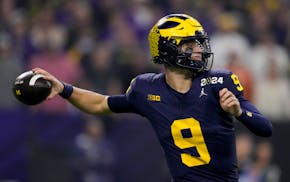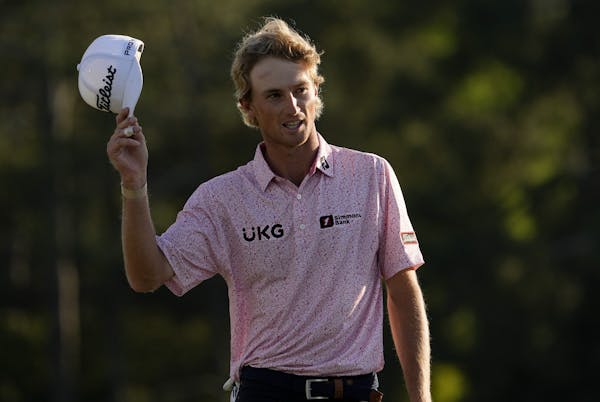AUGUSTA, GA. – As he prepared to play in the final pairing of the 2021 Masters on Sunday, Hideki Matsuyama putted on the practice green, then walked to his golf bag and pulled out a small roll of tape.
He bit off a chunk and wrapped it tightly around the tip of the middle finger of his left hand. Then he walked to the first tee and hit his first shot into the trees on the right side of the fairway, smacked the ball into play, spun a wedge 25 feet from the pin and two-putted for a bogey.
Matsuyama would admit later that he felt the pressure, that he had trouble sleeping and went to Augusta National Golf Club early on Sunday morning to work out his jitters.
Japan loves golf yet has never had a man win a major championship. Matsuyama is a superstar in his homeland but had not won a PGA Tour tournament in four years. His hands and his nerves were showing signs of wear.
Starting the day in front by four shots, he would lead by as many as six on the back nine, and then one shot rolled into the pond behind the 15th green, and he looked in need of much more adhesive.
He would hold it together, barely, winning the Masters by one stroke to make a kind of history Americans may not comprehend.
The United States doesn't send its best athletes abroad in hope of recognition and international fame. Imagine if we had asked Michael Jordan to play basketball in Japan to prove that American hoops were legitimate, then stayed up all night watching his championship games, hoping for a trailblazing victory?
Matsuyama is Japan's Jordan. While he looked composed on the 18th green after tapping in for the bogey that gave him a one-shot victory over Will Zalatoris on Sunday night at Augusta National Golf Club, Matsuyama looked exuberant during the green jacket ceremony, twice thrusting his fists into the air and beaming.
"I can't imagine what it's going to be like, what a thrill and honor it will be for me to take the green jacket back to Japan," he said. "And I'm really looking forward to it."
He said he didn't idolize many golfers growing up, instead mentioning Japanese athletes who have succeeded in the United States, including the Twins' Kenta Maeda, along with Yu Darvish and Shohei Ohtani. "The people that I admired were mainly baseball players," he said. "As far as golf, not so much. Hopefully now others will be inspired for what happened here today and follow in my footsteps."
Once he got past the first hole, Matsuyama's footsteps didn't stray from fairways and greens very often for the next 10 holes. He birdied Nos, 2, 8 and 9 to get to 13 under, at one point opening a six-shot lead.
On the par-5 15th, he smashed a 4-iron from 227 yards over the green and into the water. He would make bogey there, and on 16. He would need to play the final two holes in 1 over par to hold off Will Zalatoris, who finished at 9 under, and Matsuyama did just that.
He hit two ideal shots on No. 17 to make a routine par. He hit a perfect drive on 18, hit his second into the greenside bunker, played out to 5 feet and two-putted for the victory.
He reacted with little emotion, and his caddie, Shota Hayafuji, replaced the pin and bowed.
"When the final putt when in, I really wasn't thinking of anything," Matsuyama said. "Other than hugging Xander [Schauffele, his playing partner]. But then I saw my caddie and hugged him — I was happy for him because this was his first victory on the bag. And then it started sinking in, the joy of being a Masters champion."
Matsuyama would be a logical choice to light the cauldron at the Tokyo Olympics this summer, and he humbly said, "If I am on the team, and I might be."
"Maybe a lot of golfers thought this was an impossibility," he said. "Maybe with me doing it, that will set an example."
As he spoke, wearing the green jacket, he still had that athletic tape on his finger.

Souhan: Wolves fans made Game 1 special. Now bring on Game 2.

Souhan: Should Vikings even consider McCarthy in NFL draft?

Souhan: NAW erases Suns' lead, Game 1 advantage with big performance

Souhan: This is KAT's chance to prove Flip Saunders was right


